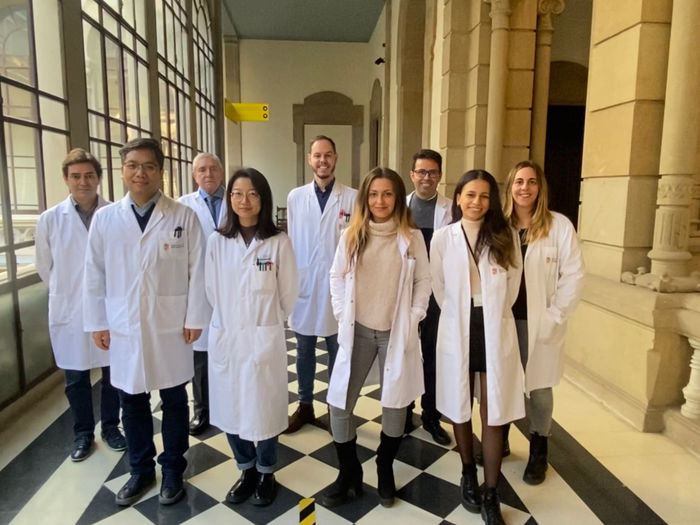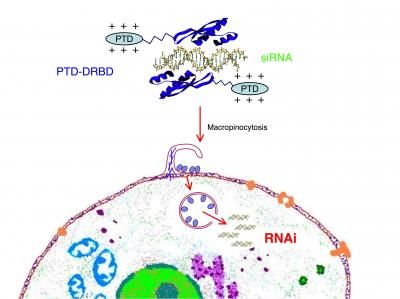Embryonic development and cancer cell growth
Embryonic factors for reprograming cancer cells
Advertisement
Researchers of the University of Barcelona and the August Pi i Sunyer Biomedical Research Institute (IDIBAPS) have shown in a study with lung cancer cell lines that the same molecular signals that control the embryonic development can also control the harmfulness of cancer cells. The results of the study, published in the Journal of Experimental & Clinical Cancer Research, can have implications in the development of new therapeutic strategies to fight lung cancer, which is currently the first cause of death worldwide.

Researchers Jordi Canals and Alfons Navarro, from the Department of Surgery and Medical and Surgical Specialty, are the first authors of a study which is the result of the collaboration with Cristina Vila and Josep M Canals, from the Department of Biomedicine of the UB. Mariano Monzó, emeritus professor of Anatomy and Human Embryology at the Faculty of Medicine and Health Sciences of the UB, led the study.
UNIVERSITY OF BARCELONA
“In this study, we observed that lung cancer cells, when cultured in a human embryonic lung mesenchyme-conditioned medium, lose the malignant phenotype, their morphology changes and they inhibit their in vivo and in vitro proliferation. Also, these change their genic expression and differentiate into myofibroblastic cells”, notes Mariano Monzó, emeritus professor of Anatomy and Human Embryology at the Faculty of Medicine and Health Sciences of the UB, and who also led the study.
Researchers Jordi Canals and Alfons Navarro, from the Department of Surgery and Medical and Surgical Specialty, are the first authors of a study which is the result of the collaboration with Cristina Vila and Josep M Canals, from the Department of Biomedicine of the UB. The researchers are also members of the Institute of Neurosciences of the UB (UBNeuro) and the Centre for Networking Biomedical Research in Neurodegenerative Diseases (CIBERNED)
The impact of the embryonic lung microenvironment
The study results from two key ideas. On the one hand, the fact that the lung embryonic development creates cell signals for the right formation and differentiation of the organ. On the other, the results of several previous studies confirmed that the abnormal expression of the genes in charge of such embryonic development can cause the growth of a tumor.
In this context, the researchers presented the hypothesis that states that the characteristics and malignant activity of lung cancer cells could acquire benign features in contact with a normal embryonic lung microenvironment.
With this objective, the researchers monitored two cell lines of non-small lung cancer cells —the most common subtype of lung cancer—, named A549 and H1299, to evaluate which morphological, functional and molecular changes occurred in an embryonic culture medium. “It is a medium derived from mesenchymal cells isolated from embryonic lung cell sketches during the pseudoglandular phase of development, its obtention has been one of the challenges in this research”, says Mariano Monzó.
The researchers also evaluated the differences between the formation of tumours and the growth of cells in a xenograft. That is, these cancer cells cultured in an embryonic medium were implanted in mice to evaluate their evolution in vivo. The results of the experiment show that the cells reduced their abilities in proliferation, migration and formation of colonies, and they also reduced their in vivo tumour growth. By contrast, the cancer cells cultured in a tumoral cancer medium kept their morphology and cancer evolution. “The study shows that lung cancer cells, due to the effect of the embryonic lung environment, acquire benign characteristics, because there is an inhibition of pluripotency factors (OSKM) and oncogenic factors (NKX2.1), and a differentiation and reduction of the tumoral proliferation”, note the authors of the study.
According to the researchers of the study, these findings indicate that the embryonic environment is able to “reprogram the phenotype of both somatic and cancer cells and that, the DNA would not be hermetic, immobile and unidirectional but it would have a high degree of plasticity, which would make it receptive to the stimuli it receives”.
Embryonic factors for reprograming cancer cells
Current therapies to fight lung cancer and solid tumours in general, consist on inducing apoptosis, or programmed death, of cancer cells, a therapy that has some problems such as toxicity and acquisition of resistance to treatments. The results of this study shed light on the design of a new potentially innovative strategy for reprograming cancer cells. “The new approach would be based on the idea of reducing self-replication of lung cancer cells, and therefore, its proliferation identifying these cells through embryonic factors secreted during the lung development”, notes Mariano Monzó.
To do so, the researchers propose the need to analyse embryonic lung factors to identify new molecules that show potential as drugs. “The next step would be to solve which are the molecular pathways and the embryonic lung factors involved in the control of the differentiation of cancer cells we have observed in the study. Once we define the pathways and factors involved in the differentiation process, we have to validate their use as targets to get a future complementary treatment for lung cancer”, conclude the authors of the study.
























































